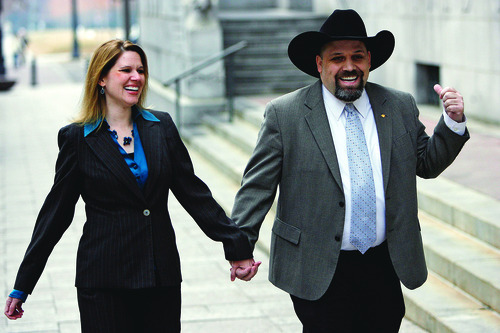This is an archived article that was published on sltrib.com in 2011, and information in the article may be outdated. It is provided only for personal research purposes and may not be reprinted.
A federal grand jury on Thursday returned a new 20-count indictment alleging Utah County businessman Rick Koerber engaged in widespread investment and tax fraud.
The indictment follows a federal judge's decision in July to throw out a key piece of evidence in Koerber's case, in which he is accused of running an investment scam that took in more than $100 million.
Assistant U.S. Attorney Stewart Walz previously said the ruling by U.S. District Judge Clark Waddoups affected a "significant" part of an existing 22-count indictment alleging fraud, money laundering and tax evasion by Koerber in his operation of FranklinSquires Cos. and related real-estate investment businesses.
Waddoups' decision forced prosecutors to seek a new indictment, which was filed Thursday, said Melodie Rydalch, public information officer for the U.S. Attorney's Office.
"There are no substantive changes in the superseding indictment," Rydalch wrote in a statement. She said small changes were made to a section of the indictment describing the alleged "scheme and artifice to defraud."
Count one of the first indictment was deleted after Waddoups' ruling, which found documents that formed the basis of count one were protected by attorney-client privilege, Rydalch said.
The indictment accuses Koerber of operating a Ponzi scheme in which money from new investors was used to pay initial and previous investors to make the businesses appear profitable and to continue to attract new money.
Waddoups' previous ruling stated a draft letter Koerber had prepared for major investors was subject to attorney-client privilege and couldn't be used against him. The government contended the letter had been sent to investors in the real-estate company, but Waddoups said testimony from Koerber and other sources indicated the letter was never sent out and remained confidential communication between Koerber and attorneys.
Waddoups said in his ruling that a government witness, Koerber's former personal assistant, was not credible when she testified she mailed out the letter on Koerber's instructions.
The letter has not been placed in the court record nor read in open court, but testimony and court filings indicate it had to do with how investors' funds would be used.
Koerber was originally indicted on three counts in May 2009, but 19 additional charges were added in a previous superseding indictment in November of that year.
Koerber was considered something of an investment guru in Utah County, where he charged large fees for seminars and classes about investing in real estate using procedures he called "equity milling." But prosecutors also said he lured in hundreds of investors with promises of high returns before the companies collapsed when the nation's real-estate bubble burst in 2008.
The indictments allege he used about half of the $100 million to pay back initial investors and also spent funds on investments other than real estate.
Koerber's attorney, Marcus Mumford, contends the government has no evidence that Koerber promised investors one thing and did something else.
Twitter: @mrogers_trib —
Koerber partner faces tax charge
Gabriel S. Joseph, a partner with Rick Koerber in the FranklinSquires Cos., also faces federal charges. Joseph was charged in April with two misdemeanors for allegedly failing to file tax returns for 2004 and 2005. He has pleaded not guilty, and a trial is set for December.



